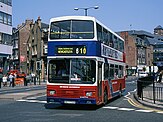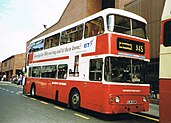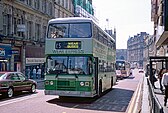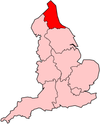Go North East
 From Wikipedia - Reading time: 13 min
From Wikipedia - Reading time: 13 min
 Wright StreetDeck in Chester-le-Street in November 2024 | |
| Parent | Go-Ahead Group |
|---|---|
| Founded | February 1987 |
| Headquarters | Gateshead, Tyne and Wear England |
| Service area | |
| Service type | Bus and coach |
| Depots | 7 |
| Fleet | 599 (at 28 May 2023) |
| Managing Director | Nigel Featham |
| Website | www |
Go North East is a bus operator running both local and regional bus services in County Durham, Cumbria, Northumberland, North Yorkshire and Tyne and Wear, England. It was previously known as the Northern General Transport Company and Go-Ahead Northern. The company was the foundation of today's Go-Ahead Group, which now operates bus and rail services across the United Kingdom, as well as Germany, Ireland, Norway and Singapore.
History
[edit]1980s: Post-deregulation
[edit]In October 1986, at the time of bus deregulation in Great Britain, the company operated from fourteen depots: Chester-le-Street, Consett, Gateshead, High Spen, Houghton-le-Spring, Jarrow, Murton, Percy Main, South Shields, Stanley, Sunderland, Wallsend, Washington and Winlaton.
As part of the privatisation of the National Bus Company, a management buyout led by Chris Moyes and Martin Ballinger saw the purchase of the Northern General Transport Company in February 1987.[1]
1990s: Early expansion
[edit]Early expansion saw the acquisition of a number of smaller competing bus operators in the region, including Langley Park-based Gypsy Queen in January 1990.[2]
In February 1990, the company's Murton depot was closed, with the loss of 20 jobs. The remaining 109 staff were redeployed to other nearby depots in Houghton-le-Spring and Sunderland.[3] In September 1990, the loss-making depot at Jarrow, and High Spen, which was making a marginal profit, were closed. Following the closures, a total of 20 jobs were lost, with a further 150 staff redeployed.[4][5][6]
By January 1991, the parent company was split into five separate subsidiary companies: Coastline, Go-Ahead Gateshead, Go-Ahead Northern, VFM and Wear Buses.[7]
In March 1995, the Go-Ahead Group acquired Bishop Auckland-based OK Motor Services for £5.4 million.[8][9][10][11] Following the acquisition, many of OK's staff, including the general manager, Charles Marshall, became employees of Go-Ahead. OK initially became one of Go-Ahead's locally managed subsidiaries, with Marshall remaining in charge. Go-Ahead later took steps to streamline the business, with several of the group's earlier acquisitions transferred to OK.[12]
In August 1998, a new depot was opened on Deptford Terrace, Sunderland. This saw the closure of the nearby Park Lane depot, which was demolished to allow the development of the current Park Lane Interchange, which opened in May 1999, ahead of the introduction of Tyne and Wear Metro services between Pelaw and South Hylton via Sunderland. Additionally, the company's depot at Philadelphia Lane, Houghton-le-Spring, was also closed at this time. The depot remained in situ until the early 2020s, until it was demolished to allow for redevelopment of the area.[13]
2000s
[edit]In February 2005, the company's depot in South Shields was closed, with operations transferred to Sunderland (Deptford).
The following year, in March 2006, Bishop Auckland depot and some operations were acquired by Arriva North East.[14] Remaining operations transferred to Chester-le-Street, with the company retaining an, albeit smaller, presence in and around the town.
In October 2007, the company acquired Stanley-based operator Stanley Taxis, which operated both commercial and tendered local bus services in County Durham and Tyne and Wear. At the time of acquisition, operations consisted of a fleet of 13 vehicles and 16 staff.[15]
2010s
[edit]In March 2010, the company swapped around 50 staff and half-a-dozen routes, as well as depots in Ashington and Hexham, with Arriva North East, allowing both companies to consolidate their operations.[16]
In June 2010, the company was awarded a five-year contract to operate the QuayLink network of services. Award of the contract saw the introduction of a fleet of nine Euro 5 diesel-powered single-deck Optare Versa.[17][18]
In January 2012, as a celebration of the company's centenary year, the OK Motor Services branding was briefly revived, following the introduction of two routes serving Bishop Auckland, Crook and Darlington.[9]
In February 2014, depots in Gateshead (Sunderland Road) and Winlaton were replaced by an £8.5 million "super depot", known as Riverside. The 5.75-acre (23,300 m2) site, located in Dunston was constructed with capacity for over 160 vehicles and 500 staff.[19][20][21]
In June 2018, Hull-based East Yorkshire Motor Services was acquired by the Go-Ahead Group, bringing an end to 30 years of family ownership. Following acquisition, the company was rebranded as East Yorkshire and operated as a standalone company within Go North East.[22][23][24][25]
In March 2019, after almost 100 years in service, Stanley depot was closed. Following closure, operations were subsequently moved to a new 2.23-acre (9,000 m2) depot at Hownsgill Industrial Estate in Consett, which is located on the site of the former Consett Steelworks. The £3.5 million depot was constructed with the capacity for 63 vehicles and 180 staff.[26][27][28]
In December 2019, a "farewell" event was held to mark the retirement of the final remaining Scania L94 vehicles – the first of which joined the fleet in March 2001. The fleet, including four articulated vehicles, grew to a total of 87 of the type – the last of which entered service in 2006.[29][30][31]
2020 – the present day
[edit]In July 2020, the company's first fully-electric zero-emission vehicle trial took place, with a single-deck Optare MetroCity serving a series of routes in Gateshead, Newcastle upon Tyne and North Tyneside.[32] Following this, in November 2020, the first of a fleet of nine zero-emission single-deck Yutong E10 were introduced on routes 53 and 54, as part of a jointly-funded project between Go North East and the UK Government's Ultra-Low Emission Bus Fund – at a cost of £3.7 million.[33][34][35][36]
In February 2022, a further zero-emission vehicle trial took place on route 21, with the evaluation of a Wright StreetDeck Electroliner double-deck vehicles.[37][38]
In March 2022, the company's depot in Peterlee, an outstation of Sunderland (Deptford) depot was closed, with operations transferred to nearby depots in Chester-le-Street and Sunderland (Deptford).[39]
In June 2022, just over four years after acquisition, it was announced that East Yorkshire would be split from Go North East, becoming a separate company within the Go-Ahead Group.[40]
In the same month, it was announced that the company intended to close Chester-le-Street depot.[41]
Following the departure of Martijn Gilbert in August 2022, the former Go North West Managing Director, Nigel Featham, assumed Gilbert's role at Go North East. At East Yorkshire, former Area Manager, Ben Gilligan, was promoted to Managing Director.[40]
In September 2023, following the closure of Arriva North East's Jesmond depot,[42] Go North East took over operation of a number of the company's routes in Newcastle upon Tyne and North Tyneside, which were subsequently rebranded as North Tyne Rockets. At the time of transfer, routes were operated by a fleet of single-deck Wright StreetLite buses, branded in a purple livery.[43]
Industrial action
[edit]In late 2023, operations suffered serious disruption, due to strike action by employees. Organised by Unite the Union, the first strikes each took place for a period of one week, beginning 30 September 2023 and 14 October 2023 respectively.
Following this, union members began an indefinite strike on 28 October 2023 – during which no services across the region, with the exception of some school and works services, operated. A limited intra-peak hour service was introduced on certain routes from 14 November 2023.[44][45]
The strike was brought to an end on 1 December 2023, when union members voted in favour of an improved pay offer, with normal service resuming the following day.[46][47] Following the strike, a special promotion was introduced whereby customers were able to travel on the network free-of-charge between 2–8 December 2023.[48]
Fleet and operations
[edit]Depots
[edit]As of January 2024, the company operates from seven bus depots across the region: Consett (Hownsgill), Gateshead (Riverside and Saltmeadows Road), Hexham, Percy Main, Sunderland (Deptford) and Washington.
Vehicles
[edit]As of May 2023, the fleet consists of 599 buses and coaches.[49] The fleet consists mainly of diesel-powered single and double-deck buses manufactured by Alexander Dennis, Optare, Volvo, Wrightbus and Yutong.
The company also operate a fleet of eighteen fully-electric single-deck buses: nine Yutong E10, introduced in November 2020,[33][34][35][36] and a further nine Yutong E12, introduced in September 2022.
Branding
[edit]From the late 1990s until the early 2010s, the standard fleet livery consisted of vehicles branded in a red, blue and yellow colour scheme. In 2006, the company introduced route branding – a practice which aimed to give each service, or group of services, a recognisable identity, colour scheme and logo.[50][51] Route branding has since led to the company adopting a multi-coloured fleet of vehicles across the region.
In 2013, an updated standard fleet livery was introduced, which saw the red, blue and yellow colour scheme phased out. The rebranding exercise saw vehicles without route branding painted in an all-over red colour scheme. This proved to be short-lived, with the standard fleet livery further updated in 2016.[52] Vehicles were repainted red at the front, and blue at the back, separated by a white strip, with a tagline and website featuring above the windows on single-deck buses, or below the lower-deck windows on double-deck buses.
In 2019, a number of minor adjustments were made to the, now standard, standard fleet livery – including the use of a lighter shade of blue at the rear and replacement of the curved white separation strip with a double white and yellow diagonal line. At the time of the refresh, only around one-third of vehicles in the fleet wore the standard fleet livery.[52]
The following year, a fleet of coaches used for private hire and contract services, were repainted into a range of retro-inspired heritage liveries,[53] with a number of single and double-deck buses used on local and regional services, as well as private hire and contract services, following later.[54][55]
As well as local and regional bus services, the company also operate coach services under contract to National Express. Vehicles are painted in an all-white livery, featuring the client's distinctive blue and red logo.[56]
References
[edit]- ^ "NBC sale at halfway stage". Commercial Motor. 16 May 1987. p. 21.
- ^ "Gypsy taken over". Commercial Motor. 11 January 1990. p. 29.
- ^ "Go-Ahead to rationalise". Commercial Motor. 16 November 1989.
- ^ "Sparring partners?". Commercial Motor. 15 November 1990. p. 44.
- ^ "TGWU warns of depot tender trap". Commercial Motor. 20 September 1990. p. 20.
- ^ "...Go-Ahead jobs go". Commercial Motor. 13 September 1990. p. 18.
- ^ "Staff get ahead to head Go-Ahead five". Commercial Motor. 8 November 1990. p. 20.
- ^ "Annual report for the year ending June 1995" (PDF). Go-Ahead Group. 1995. Archived from the original (PDF) on 7 December 2014. Retrieved 31 March 2022.
- ^ a b Amos, Mike (24 January 2012). "Omnibus edition". The Northern Echo. Retrieved 31 March 2022.
- ^ Monopolies and Mergers Commission (1996). The Go-Ahead Group plc and OK Motor Services Limited: a report on the merger situation. Department of Trade and Industry. London: H.M.S.O. ISBN 0-10-131502-3. OCLC 34627271.
- ^ Holding, David (2007). A History of OK Motor Services. Newbridge, Midlothian: Bus Enthusiast Publishing Company. ISBN 978-0-946265-39-8. OCLC 912905469.
- ^ Brown, Stewart J. (1996). Buses in Britain. Harrow Weald, Middlesex [England]: Capital Transport. ISBN 1-85414-181-3. OCLC 36802507.
- ^ "End of an era as ex-workers gather before former bus depot is demolished". Sunderland Echo. 15 April 2018. Retrieved 11 February 2024.
- ^ "Transport improves for Valley residents". The Northern Echo. 9 June 2006. Retrieved 15 March 2020.
- ^ "Completed acquisition by Go North East of Stanley Taxis" (PDF). Office of Fair Trading. 1 April 2008. Retrieved 29 April 2024.
- ^ "Anticipated acquisition by Go North East Limited of the bus operations of Arriva Northumbria Limited in Hexham, Northumberland" (PDF). Office of Fair Trading. Competition and Markets Authority. 26 May 2010. Archived from the original (PDF) on 5 November 2013. Retrieved 1 April 2022.
- ^ "New diesel QuayLink buses still eco-friendly". Evening Chronicle. 10 August 2010. Archived from the original on 28 March 2020. Retrieved 28 March 2020.
- ^ "Brand new QuayLink fleet takes to the road". Tyne and Wear Passenger Transport Executive. 9 August 2010. Archived from the original on 1 November 2017. Retrieved 28 March 2020.
- ^ "Gateshead Riverside - Go-Ahead North East's new £8.5m depot open". Bus & Coach Buyer. 7 February 2014. Retrieved 28 March 2022.
- ^ "Go North East opens new 'super depot'". Coach & Bus Week. 4 February 2014. Retrieved 28 March 2022.
- ^ "New super depot tops off £30m investment at Go North East". Intelligent Transport. Retrieved 28 March 2022.
- ^ "Go-Ahead Welcomes East Yorkshire Motor Services into Go North East". Go North East. 18 June 2018. Retrieved 28 February 2020.
- ^ Ford, Coreena (18 June 2018). "Newcastle transport giant Go North East snaps up East Yorkshire bus company". Evening Chronicle. Retrieved 29 March 2022.
- ^ Campbell, James (18 June 2018). "Hull bus company EYMS has been sold". Hull Daily Mail. Retrieved 29 March 2022.
- ^ Forster, Andrew (22 June 2018). "Shipp sells EYMS to Go-Ahead as operator falls into the red". TransportXtra. Retrieved 29 March 2022.
- ^ "Go North East unveils new £3.5m Consett base". Go North East. 18 March 2019. Retrieved 28 March 2022.
- ^ Havery, Gavin (19 March 2019). "Bus depot opens on former steelworks site". The Northern Echo. Retrieved 28 March 2022.
- ^ Dunn, Madaline (19 March 2019). "Go North East unveils new £3.5m Consett base". Coach & Bus Week. Retrieved 28 March 2022.
- ^ "Special event to mark hard working bus fleet bowing out after nearly 20 years". Go North East. 9 December 2019. Retrieved 29 April 2024.
- ^ Unwin, Bruce (3 January 2020). "Loyal servant of the region's roads honoured at farewell event". The Northern Echo. Retrieved 29 April 2024.
- ^ Wilson, Saffron (8 January 2020). "Go North East says goodbye to Scania L94 at event". Routeone. Retrieved 29 April 2024.
- ^ "Go North East commits to improving air quality with further electric bus trials ahead of investment". Go North East. 17 July 2020. Retrieved 13 February 2024.
- ^ a b "Go North East launches game-changing electric buses in Newcastle and Gateshead". Go North East. 27 November 2020. Retrieved 27 March 2022.
- ^ a b "Voltra: Go North East launches zero-emission fleet with Yutong". Routeone. 27 November 2020. Retrieved 27 March 2022.
- ^ a b "The region's first electric buses are launched in Newcastle and Gateshead". Tyne and Wear PTE. 27 November 2020. Retrieved 27 March 2022.
- ^ a b "New bus fleet will "reduce Gateshead's reliance" on fossil fuels". Gateshead Council. 27 November 2020. Retrieved 27 March 2022.
- ^ "Go North East trials electric double-decker bus on popular Angel 21 route". Go North East. 28 February 2022. Retrieved 30 March 2022.
- ^ Jackson, Peter (8 March 2022). "Go North East trials electric double-decker". Coach & Bus Week. Retrieved 30 March 2022.
- ^ Scott, Jim (28 March 2022). "Bus company makes 'difficult' decision and permanently shuts County Durham depot". The Northern Echo. Retrieved 28 March 2022.
- ^ a b "Martijn Gilbert to leave The Go-Ahead Group". Routeone. 7 June 2022. Retrieved 7 June 2022.
- ^ Scott, Jim (8 June 2022). "Go North East to close major depot in County Durham affecting hundreds of staff". The Northern Echo. Retrieved 24 July 2022.
- ^ Hall, Daniel (12 August 2022). "Arriva bus depot to close in October with staff to move". Evening Chronicle. Retrieved 29 April 2024.
- ^ "New services in North Tyneside from Sunday 3 September". Go North East. 2 August 2023. Retrieved 13 February 2024.
- ^ "Bus strike: Go North East to restore skeleton service from tomorrow". ITV News. 13 November 2023. Retrieved 13 February 2024.
- ^ "Go North East bus strike skeleton service launched". BBC News. 14 November 2023. Retrieved 13 February 2024.
- ^ "Update on Industrial Action" (Press release). Go North East. 23 November 2023. Retrieved 25 November 2023.
- ^ Holland, Daniel (1 December 2023). "Go North East bus strike to end as workers vote to accept new pay offer after weeks of travel chaos". Evening Chronicle. Newcastle upon Tyne. Retrieved 1 December 2023.
- ^ "Welcome back: free travel on Go North East buses for seven days". Go North East. 1 December 2023. Retrieved 13 February 2024.
- ^ "Weekly Disposition - 28 May 2023" (PDF). Go North East. 28 May 2023. Retrieved 24 October 2023.
- ^ "Go North East adopts new route branding". Bus & Coach Professional. 15 August 2006. Archived from the original on 12 December 2007. Retrieved 13 February 2024.
- ^ "More brands, fares pilot as Arriva reacts to Go North East revamp". Buses. No. 619. Hersham: Ian Allan Publishing. October 2006. p. 10. Retrieved 26 May 2024.
- ^ a b Jenkins, David (17 December 2020). "New brands, new fares". Buses. No. 790. Stamford: Key Publishing. pp. 47–49. Retrieved 1 May 2024.
- ^ Dougall, Emily (18 February 2020). "Go North East brings back retro brands for coach unit". Coach & Bus Week. Peterborough. Retrieved 29 March 2022.
- ^ "Go North East unveils multi-coloured bus to celebrate the work of its team in bringing communities together". Go North East (Press release). 25 June 2020. Retrieved 8 June 2022.
- ^ "Go North East celebrates heritage with Tynemouth repaint". routeone. 28 June 2021. Retrieved 8 June 2022.
- ^ "New Identity for National Express Group". National Express. 15 November 2007. Archived from the original on 25 February 2020. Retrieved 25 February 2020.
External links
[edit] Media related to Go North East at Wikimedia Commons
Media related to Go North East at Wikimedia Commons- Go North East Limited on Companies House
- Go North East website
 KSF
KSF









